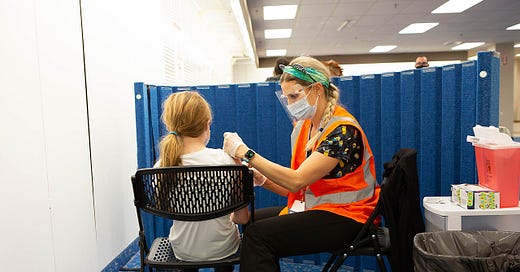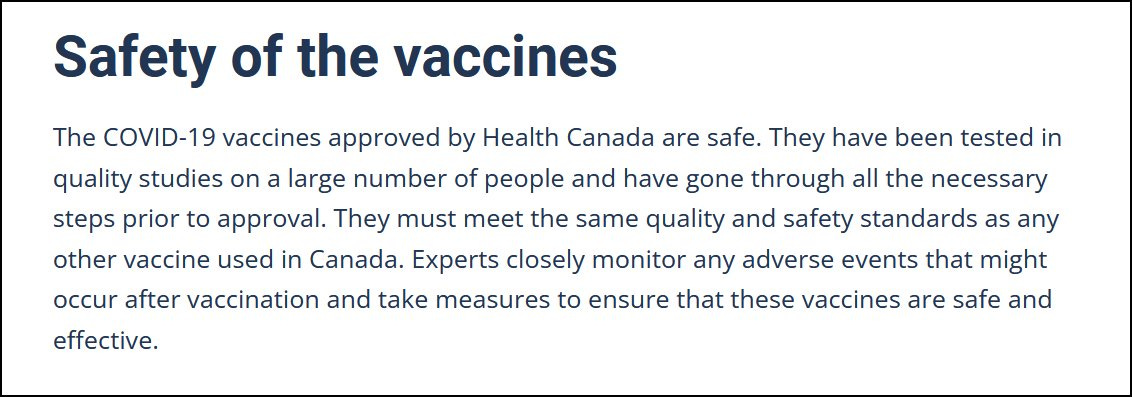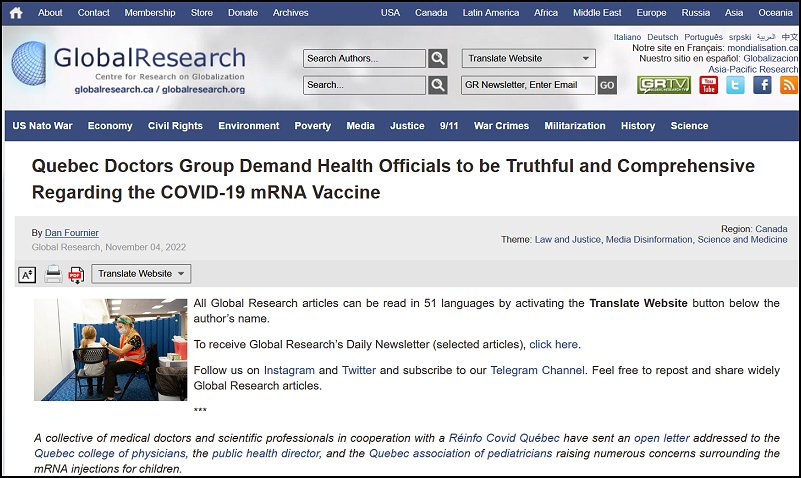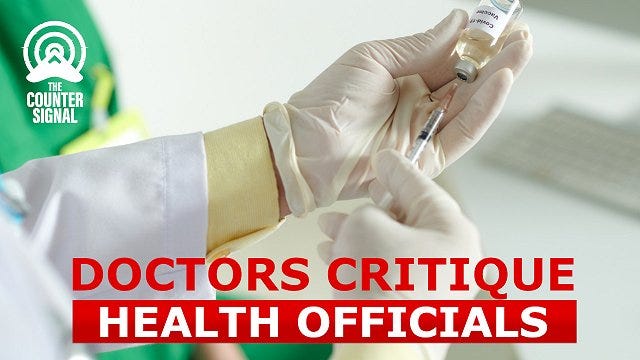Quebec doctor group asking health officials to be truthful & complete about Covid-19 mRNA-based vaccinations
by Dan Fournier, published Monday, Oct. 31, 10:55 EDT on fournier.substack.com
A young girl receives a Covid-19 vaccination. Image source: Wikimedia Commons
A collective of medical doctors and scientific professionals in cooperation with a Réinfo Covid Québec have sent an open letter addressed to the Quebec college of physicians, the public health director, and the Quebec association of pediatricians raising numerous concerns surrounding the mRNA injections for children.
The open letter is specifically addressed to Dr. Luc Boileau (public health director), Dr. Mauril Gaudreault (President of the Quebec college of physicians), and Dr. Marie-Claude Roy (President of the Quebec association of pediatricians) and was signed by 19 medical doctors, researchers and pharmacists.
The letter was produced in collaboration with Réinfo Covid Québec, an arm of an international collective of 4,000 doctors and 80,000 members.
The group describes itself as a collective of caregivers, doctors and citizens gathered around an idea: the need for a fair and proportionate health policy in Quebec and elsewhere in the world.
In short, the Quebec chapter of the collective aims to provide a unified voice for doctors, health care professionals, and citizens to express their concerns and views regarding the Covid-19 pandemic health measures adopted in the province and its consequences – many of which they feel aren’t being equally shared and honestly discussed by traditional media and health authorities.
Though the open letter is quite lengthy and detailed, here are some of the principal contentions held therein [Google translated from French]:
“The principles underlying this text are those found in the Civil Code of Quebec, articles 10 and 11 and of Canada as well as the code of ethics of Quebec physicians. Some fall under the Nuremberg Code.”
“The physician's personal and unavoidable duty, enshrined in his code of ethics, and from which he cannot escape, requires him to ensure that free and informed consent is obtained from the patient.”
“Free means without threat or constraint and, in the case of an investigational pharmaceutical product, without any promotion.”
“Informed means that the patient receives truthful, factual, complete and clearly expressed information.”
“An experimental product of gene manipulation was presented as a “vaccine like any other”. This product has been presented as a “safe and effective vaccine”.
“If we seek the support of the institutions that are the Public Health Department and the College of Physicians of Quebec (CMQ), it is in order to allow parents in Quebec to make free and informed decisions; decisions which, it should be mentioned, are irreversible.”
“Complete information, which includes all the dangers of a pharmaceutical product, is an unavoidable ethical obligation. What we have found as information communicated to parents in the context of anti-covid vaccines is ethically and scientifically insufficient, hence this text, which aims to better inform them.”
“Censorship that deprives parents of information essential to informed decision-making is unacceptable.”
“This text will also be sent to the media. Journalists or “decryptors” may want to comment on this information. They are free to do so. However, we ask them to disclose their sources and their possible conflicts of interest and to demand the same from all specialists they call to speak publicly as required by the journalistic code of ethics. Nothing less than the lives and health of children in Quebec are at stake.”
“Obligation to inform, Informed consent: Before prescribing or giving a treatment or a drug, the doctor, the government or Public Health, in this case, has an ethical and legal obligation to provide the person with all the information relating to the product concerned. This is an unavoidable duty of physicians and it is also a legal obligation enshrined in the Civil Code of Quebec, articles 10 to 25. This obligation is inspired by the principle of "inviolability of the person" and his "right to the truth".
“Freedom of choice: The person must have complete freedom to accept or refuse any pharmaceutical product without being rewarded or penalized for their choice. This is true for both adults and children.[1] As the gene vaccine against COVID-19 is an unlicensed experimental product authorized under the guise of public health emergency and which, moreover, has not been adequately tested in animals, there should be no promotion of this product, and, above all, there should be no adverse consequences for anyone who refuses. No pressure should be exerted on the person. [2] (See section 9).”
“Informed choice: no information should be hidden: For the choice to be informed, all available information (potential advantages and disadvantages, risks, uncertainties) must be provided and transmitted in understandable language. However, the highest authorities (Dr. Rochelle Walensky, CDC) have affirmed that the information on the gene vaccine cannot all be disclosed. In addition, the manufacturers of mRNA injections still refuse, even if their products are deployed on a global scale, to reveal the exact composition alleging that it is a trade secret. The authorities concerned, the World Health Organization, Public Health of Quebec, Health Canada, the College of Physicians of Quebec (CMQ), our governments (federal and provincial) have not required pharmaceutical companies to disclose the exact composition of their products. Consequently, it is impossible to obtain truly informed consent, which contravenes the fundamental principles of the CMQ.”
“Parent Consent and Responsibilities: Never has an experimental product been administered to human beings without full animal testing since the tragic drugs thalidomide[3] and DES[4] administered to pregnant women.”
“Children are not able to understand the information transmitted for consent to be considered truly “informed”. Thus, the parent who gives his authorization on behalf of his child must understand
1. that it is an irreversible intervention whose short and medium term consequences are unknown and often underestimated, and whose long term repercussions (including the risk of infertility) are unknown due to the absence of hindsight;
2. that he makes a decision on behalf of his child, considered incapable of deciding for himself, and that this is a long-term responsibility;
3. that this mRNA injection is a product that has never been used on a large scale in humans and is totally different from all the vaccines we have been used to. It is false to claim that this injection is a “vaccine like the others”.
“Risk/benefit balance: One must always ask whether the product has more advantages or more disadvantages (risks). We must also take into account the age and particularities of the child concerned. The studies carried out in children by the manufacturers did not meet the minimum criteria of validity (necessity, efficacy and safety). These studies are scientifically insufficient and unsatisfactory. They have nevertheless been accepted by the FDA and by Health Canada. First of all, you have to know that the vast majority of children have already acquired a natural immunity against COVID-19 and then that children are very rarely seriously affected by the disease. In addition, it is now recognized by the CDC, since August 6, 2021, that this vaccination does not prevent either contracting the disease or transmitting it.”
“The benefits of this product for our children have not been satisfactorily explained, let alone demonstrated, by Public Health or the Government of Quebec. There are therefore unproven benefits, but the risks are indisputable and sometimes irremediable, thus subjecting children to unnecessary and unjustified danger.”
“Product not tested on animals? For a drug product to be approved, it must first have been tested in animals (mice, rats, and rabbits of both sexes and pregnant animals). In the climate of urgency surrounding this pandemic and in the rush to manufacture a "vaccine", the manufacturer considerably shortened the crucial stage of animal testing, which would have taken several years for all phases are completed. Complete studies of bio-distribution and toxicity normally required have also been neglected. The disastrous examples above of Thalidomide and DES causing fetal malformations, infertility and vaginal cancers should have prompted us to be more cautious. It is important to mention that novel, experimental and mRNA vaccines, whose risk/benefit profile is unfavorable for young people and children in good health, benefit from a marketing authorization under a decree of emergency, even though there has never been an emergency in the pediatric population.”
“Is it a “safe and effective” product? A safe product? No, since Pfizer has identified 1,291 side effects that may result from its product. The VAERS (Vaccine Adverse Event Reporting System) which is a self-reporting system of side effects by the American population, whose data everyone can consult, mentions, as of September 16, 2022, 1,418,220 reports of side effects in all age groups, including over 31,000 fatalities and nearly 260,000 serious injuries. Moreover, it is considered, according to an analysis commissioned by the FDA, that the actual frequency should be multiplied by 10 or 100.”
“Efficient? Currently the authorities cannot explain certain official statistics including the many deaths by COVID in doubly or triply vaccinated people, sudden deaths in athletes as well as excess mortality statistics; this raises legitimate questions. Has the effectiveness of “vaccines” in healthy people really been demonstrated? [8]”
“Ethics: vaccinating children to protect adults??? The INSPQ affirms in its report intended for the Quebec government that it can be ethical to vaccinate children to protect the elderly and vulnerable. This logic of the INSPQ is all the more questionable as:
(1) It is not children who transmit COVID to the elderly, but adults who transmit it to children.
(2) “Vaccination” does not prevent either contracting the disease or transmitting it, and does so with the same intensity.”
“As a conclusion: We have attached ourselves to the obligation of truth and to the nature and extent of the information which must be transmitted to parents and which is essential for an informed decision-making concerning the inoculation of their child with an experimental product based on messenger RNA.”
“On the other hand, we believe that the Collège des médecins du Québec and the Direction de la santé publique could facilitate more informed decision-making by producing a document that is neither promotional nor propagandistic and which would include the information contained in the current.”
“In short, we, the signatories, are asking our indispensable regulatory institutions, the Direction de la santé publique and the Collège des médecins du Québec, to put science back on the agenda regarding the vaccination of children.”
“This also constitutes a formal notice in compliance with article 39 of the code of ethics of physicians concerning the reporting of a situation that endangers the population, in this case the children of Quebec. If the above is consistent, a complete and immediate ban on the vaccination of children in Quebec against COVID-19 is necessary, if only by virtue of the precautionary principle ("First, do no harm" ).”
Verifying some claims made by the group
While it would too lengthy to verify all of the claims found in the contentions enumerated above, some are worth checking.
Firstly, the group claims that the vaccines should not be promoted since they were not fully tested on animals.
If we look at the information on the Quebec Health website, we can notice the following in the section Safety of the vaccines:
Previous versions (such as that of Oct. 29, 2021) somewhat varied and used to include a hyperlink pointing to the page that describes all the steps in the vaccine development process, including conducting preclinical studies in animals.
While it remains unclear why Quebec Health removed the link to the Vaccine development process page, the current page does state that they “have gone through all the necessary steps prior to approval” which remains disputable, given insufficient testing on animals.
As for the legality in promoting the vaccines, the group cited Section 9 of the Canadian Food and Drugs Act which states:
“9 (1) No person shall label, package, treat, process, sell or advertise any drug in a manner that is false, misleading or deceptive or is likely to create an erroneous impression regarding its character, value, quantity, composition, merit or safety.”
Advertising the mRNA Covid-19 vaccine in a manner that suggests it has met “the same quality and safety standards as any other vaccine used in Canada” is highly questionable since it was not fully tested on animals, it was hurriedly released and administered under an emergency directive, and was as an experimental product of gene manipulation very different from conventional vaccines.
One of the other key contentions of the group was that the health authorities do not meet required ethical standards specifically with regards to the completeness of information communicated to parents, that they fail in their obligation to provide informed consent, and that the public health authority, the INSPQ, had asserted it an ethical justification to vaccinate children in order to protect the elderly and vulnerable.
Moreover, they stress that complete information should include the dangers and risks of the vaccine, but parents are not informed of all of these due to censorship. And consequently, it deprives them of making an informed decision.
Informed consent is a complex concept with many norms and standards to follow as well as relevant laws which are well beyond the scope of this article. Notwithstanding, the claim that the health authority advocated to the Quebec government the advantages of vaccinating children to protect more vulnerable groups is easily verifiable.
In this regard, the group makes reference to the INSPQ’s publication entitled Vaccination contre la COVID-19 chez les enfants âgés de 6 mois à 4 ans au Québec (English: Vaccination against COVID-19 in children aged 6 months to 4 years in Quebec) for the allegation. The document in question does state the following:
English translation (via Google Translate):
“9 Ethical Considerations
Vaccination of children raises certain questions
ethics that have been discussed in detail in the notice for
vaccination against COVID-19 of children aged
5 to 11 years(6).
Specifically for young children, remember the
issues related to non-maleficence: given that the
anticipated benefits of youth vaccination
children are less than for other groups
age, the individual risks must be low and the
vaccination must have an excellent safety profile.
The possible negative impacts of vaccination against
COVID-19 on the offer and acceptability of others
routine vaccines should also be minimized,
in order to respect the principle of non-maleficence.
Moreover, from a utilitarian point of view, the principle of
solidarity can make it possible to ethically justify the
vaccination of young children in the context of a
uncertain benefit/risk ratio at the individual level,
especially if the vaccination of young children offers
societal benefits (for example, if vaccination
protects other people more
vulnerable). It could also allow
parents who identify their child at risk of
developing complications as a result of an infection
to SARS-CoV-2 to benefit from this strategy
preventative, should it become offered or recommended.”
They key passage here is “Moreover, from a utilitarian point of view, the principle of solidarity can make it possible to ethically justify the vaccination of young children in the context of a uncertain benefit/risk ratio at the individual level, especially if the vaccination of young children offers societal benefits (for example, if vaccination protects other people more vulnerable)”.
It is clearly stated that the health authority, the INSPQ, is indeed suggesting vaccinating children in order to protect more vulnerable groups of society.
While the group has raised many important questions surrounding the numerous and contentious issues raised in their open letter, it remains to be seen if any of the targeted health authorities will reply, as they seldom do.
The author of this article has contacted Réinfo Covid Québec to inquire as to whether they have received any response from any of the three health authorities to whom they have addressed the letter, but has not received a reply as of publication time. Should they respond, a note will be added in the comments section for this article.
At the very least, the group of doctors and health care professionals who penned this open letter have provided the public in Quebec and elsewhere in Canada with a lot to contemplate.
Disclaimer:
None of the contents of this article is to be taken as medical or health-related advice. Seek independent professional consultation before making health-related decisions. The author has no relation and affiliation with Réinfo Covid Québec, nor should this article be taken as an endorsement. See the author’s About page for full disclaimer.
Notes:
This article has also been published in GlobalResearch.ca.
An abridged version of this article is also published in The Counter Signal and tweeted by their editor-in-chief Keean Bexte.










Nothing better than a conspiracy journalist to assess conspiracy doctors